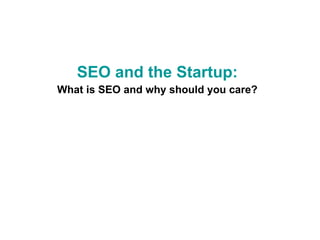Seo Presentation Feb2010
- 1. SEO and the Startup: What is SEO and why should you care?
- 2. What is SEO? Search engine optimization ( SEO ) is the process of improving the volume or quality of traffic to a web site from search engines via "natural" or un-paid ("organic" or "algorithmic") search results. As an Internet marketing strategy, SEO considers how search engines work and for what people search. Source: Wikipedia
- 3. What is SEM? Search engine marketing ( SEM) is a form of Internet marketing that seeks to promote Web sites by increasing their visibility in search-engine result pages (SERPs) through the use of paid placement, contextual advertising, paid links and paid inclusion. Source: Wikipedia
- 4. Paid vs. Organic Search
- 5. Why care about SEO? US Internet users spend an average of 17 hours per week online. 65% of Internet users look for information about various products and services on the Internet and buy online 22% of users have a specific search engine dedicated as their home page. 66% of Internet users make purchases online. 52% of Internet users do not click on online ads. 2009 study by the University of South Carolinaâs Center for the Digital Future
- 6. â I will see results immediately.â Truth: SEO is no guarantee, and it takes time. Establish relevancy Participate Remain fresh Age is power
- 7. â I can buy my way to the topâ Truth: Pay Per Click (PPC) is not SEO Quick fix Way to drive new traffic Way to consistently feed new visitors to your site The parameters for search rankings are always in flux, so you need to constantly be working on SEO.
- 8. â Itâs all about keywords.â Truth: SEO is a multi-tiered strategy that is always in flux. Page Rank Page Speed Hits Relevancy Frequency Bookmarks Programming elements Links Listings Keywords URL Structure Domain redirects
- 10. What is Page Rank & how do I improve it? PageRank relies on the uniquely democratic nature of the web by using its vast link structure as an indicator of an individual page's value. In essence, Google interprets a link from page A to page B as a vote, by page A, for page B. But, Google looks at more than the sheer volume of votes, or links a page receives; it also analyzes the page that casts the vote. Votes cast by pages that are themselves "important" weigh more heavily and help to make other pages "important". Google ranks on 0-10 scale Number of inbound links + Page Rank of inbound linked pages Relevance of search words on page and actual page visits
- 11. Search Ranking = Relevance * PageRank 0-3:Â New sites or sites with very minimal links 4-5: Â Popular sites with a fair amount of inbound links 6: Â Very popular sites that have hundreds of links, many of them quality links 7-10: Â Usually media brands (NYTimes.com), big companies or A-list bloggers. Source: Hub Spot
- 12. Bookmarking Sites + Listings Bookmarking sites Digg Delicious Technorati Networked Blogs Loaded Web Industry Directories Listings Google Local Business Center Yelp Yahoo! Local Features Bing Listings Merchant Circle Insider Pages Yellow Pages Super Pages
- 13. How to acquire hits? Blog: Have a Web site news page and post to it regularly â no less than once per month. Social Media: Use Facebook, Twitter, LinkedIn, YouTube etc. to link people to your site Participate in industry-related blogs establishing your expertise and linking back to articles youâve already written Bookmark articles and make âlistâ stories that people will also want to index Email Marketing Build your database and send regular email blasts with relevant information to your clients Use sophisticated email marketing software that allows segmenting Track results and analyze data PPC Links Listings
- 14. In the Land of Code Title Tags Description Tags Header Tags â not images URL Structure Domain Redirect Navigation Flash Elements â use sparingly Name Images Submit Site Maps Add Google Analytics â itâs free! Small File Sizes â increase speed
- 15. Title & Description Tags Unique title tags for each page â 70< characters Unique , relevant content description for each page â 150< characters
- 16. URL Structure Bad Structure Good Structure
- 17. Google Analytics
- 18. Selecting an SEO Team The Keyword Confusion Red Flag: An SEO company provides you with keywords. The Minimum Red Flag: SEO firm is more than optimizing a few pages of your siteâĶevery page should be treated as a homepage. The No References Red Flag The Guarantee Red Flag: If your SEO firm guarantees that your web site will have high search engine rankings or a high number of leads, theyâre lying. The Opaque Red Flag: Hidden practices are a tip-off. The âGet âer Doneâ Red Flag: Beware of firms claiming SEO is a âone-time thing.â Source: Finding The Company That Gets You Found On The Web by JoAnna Dettmann and Kaysha Kalkofen, tSunela
- 19. Helpful Links Google Keywords Tool https://adwords.google.com/select/KeywordToolExternal Google Webmaster Tool http://www.google.com/webmasters/ Bing Webmaster http://www.bing.com/webmaster Yahoo Site Explorer (Webmaster tool) http://siteexplorer.search.yahoo.com/ Hub Spotâs Website Grader â a good starting point but not foolproof http://websitegrader.com/ Google Page Speed Tool http://code.google.com/speed/page-speed/ Yahoo! Page Speed Tool http://developer.yahoo.com/yslow/ SEOMoz http://www.seomoz.org/mozbar



















